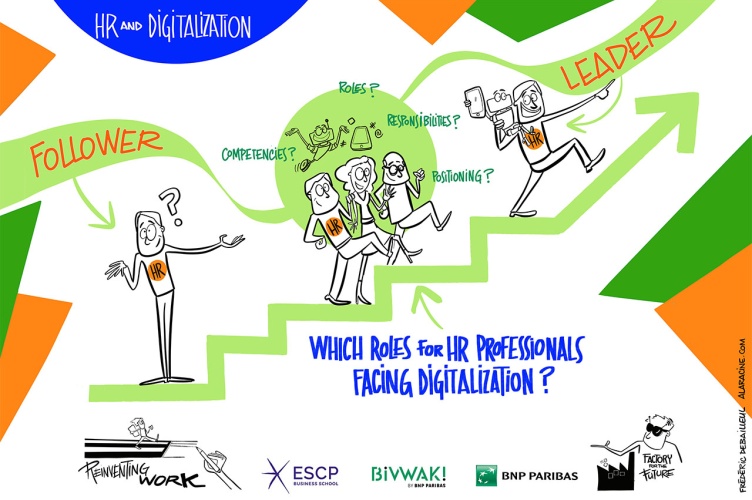HR & Digitalisation A fascinating project launched in January 2020
Research context
Digitalisation’s impact on HR function, roles and practices has been tremendous over the past years. Research has highlighted the impact of digitalisation on operational HR objectives (reducing costs and administrative workload). However, HR also has responsibilities regarding relational goals (e.g. delivering services and supporting managers and employees) as well as transformation goals (e.g. aligning HR policy and practices with the company’s strategy). In this renewed context, digitalisation could offer the HR function the opportunity to better address relational and transformational goals, and eventually, take the lead as the success of digitalisation lies more on the employees buy-in than on the technology.
In this research, we aim to understand, in a prospectivist approach, how HR professionals view the future of their roles: will they be following the digitalisation, supporting managers or leading the transformation?
Research question
Does digitalisation make HR goals and practices evolve and, if so, with which consequences for HR professionals?
Methodology and milestones
Delphi methodology
Iterative data collection based upon experts’ points of view in order to identify consensus and differences
3 waves of data collection through questionnaires
Involving HR professionals from 2 companies
- 24 from BNP Paribas
- 13 from Safran Aircraft Engines
Research team
- Géraldine Galindo (ESCP, Paris campus)
- Emmanuelle Léon (ESCP, Paris campus)
Research keytake aways
The mastery of HR data appears to be key in the coming years for all HR professionals. However, very few of them intend to develop their competencies in this field.
Most HR practices can be digitalised in the future. Nevertheless, HR professionals highlight the risk of doing so without studying the pros and cons.
A taxonomy of HR professionals has been developed upon 2 dimensions:
- positive/negative view of digitalisation
- HR function as a leader or as a follower of digital transformation
Overall, participants to this research have a positive view of digitalisation. Within BNPP, half of the respondents consider that the HR function will lead the transformation in the years to come, whereas 2/3 of SAE HR professionals consider that it will mainly support managers, without the power nor the competencies to actually lead the digital transformation.
Attention points: HR data reliability, Data training for HR professionals, Segmentation of HR practices depending on the added value of digitalisation.
Key outcomes
Published academic papers
■ Galindo, G., & Léon, E. (2023). “Visions prospectives de la fonction RH à l’ère de la transformation digitale au travers de la méthode DELPHI”, Revue de gestion des ressources humaines (link)
■ Galindo, G. & Léon, E. (2023). “Les professionnels RH doivent s'emparer de la digitalisation de leur fonctions”, The Conversation (over 4.000 readers)(link)
Campuses
